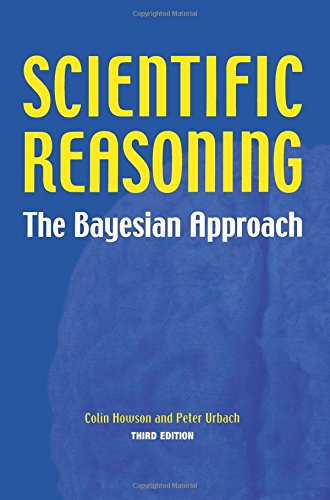Scientific Reasoning: The Bayesian Approach pdf download
Par smith tricia le dimanche, août 14 2016, 05:37 - Lien permanent
Scientific Reasoning: The Bayesian Approach . Colin Howson, Peter Urbach

Scientific.Reasoning.The.Bayesian.Approach..pdf
ISBN: 081269578X,9780812695786 | 340 pages | 9 Mb

Scientific Reasoning: The Bayesian Approach Colin Howson, Peter Urbach
Publisher: Open Court
(Howson and Urbach, Scientific Reasoning: The Bayesian Approach, 1989, p. Posted by Lydia | May 22, 2013 12:21 PM. For example, Bayesian approaches will *clearly* allow two incompatible models to be supported by the evidence. Scientific Reasoning: The Bayesian Approach. I remain very interested in this question of the formalisation of scientific reasoning, and – following the original Robot Scientist paper – a new article sets down such an approach and its application to the (more or less) automated reuse of scientific knowledge. Unfortunately, Silver's discussion of alternatives to the Bayesian approach is dismissive, incomplete, and misleading. The course content is based on the use of likelihood ratios, an approach that is supported by the International Society of Forensic Genetics, the European Network of Forensic Science Institutes and the Association of Forensic Science Providers. Most critics of standard statistics advocate the Bayesian approach to statistical reasoning, a methodology that derives from a theorem credited to Bayes, an 18th century English clergyman. This is especially so from a Bayesian point of view, and I much enjoyed reading a clear and formal (and not so new) exposition of this. It lasts 6 months with a workload per week of 3 hours on the online (glass, fibres, gunshot residues), drugs and arson. Scientific.Reasoning.The.Bayesian.Approach..pdf. As he pointed out, the problem lies with The basis of frequentist reasoning is a prediction of the outcome of many repetitions of the same test, providing an estimate of how frequently a particular result will show up. It seemed like a good place to start to learn Bayesian reasoning, although I don't know where the "normal" place to start would be. In honour of the 250th anniversary of this publication, Bradley Efron examined the question of why Bayes' theorem is not more widely used -- and why its use remains controversial among many scientists and statisticians. I'm currently reading "Scientific Reasoning: The Bayesian Approach" by Howson and Urbach. Application of BNs for case based probabilistic reasoning and scientific evidence assessment. Second, (I) is rejected by practically all normative approaches to scientific reasoning.